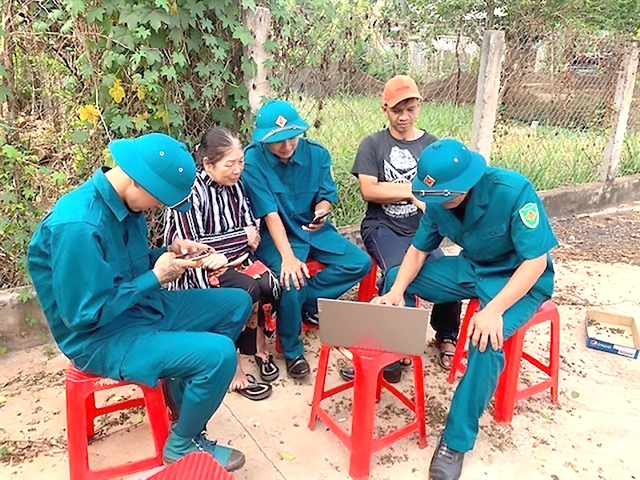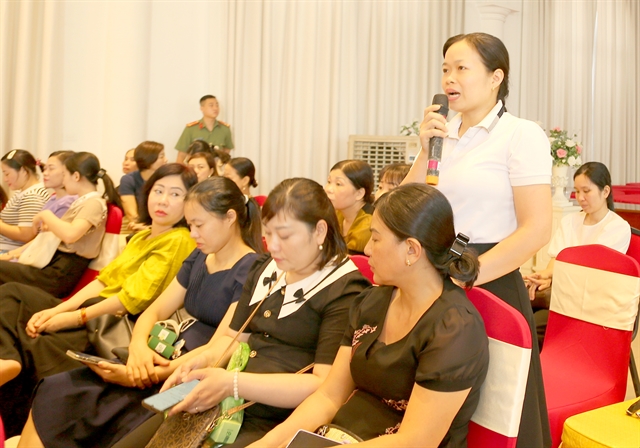 Society
Society

If women do not know how to protect themselves, they will be at high risk of being abused in cyberspace, not only through fraud but also invasion of their privacy. Women and girls need to be informed and understand the ways to protect themselves. Therefore, the Việt Nam Women's Union strengthens training to provide skills for its members.

|
| Soldiers give information about cyber security to locals in Nhơn Hòa Town, Chư Pưh District, the Central Highlands province of Gia Lai. — VNA/VNS Photo Hồng Điệp |
HÀ NỘI — The development of information technology, internet services and social networks has opened up many new opportunities for individuals and community, however, cyber fraud is also increasing, with the main victims being women and children.
Vừ Thị Mỷ, 16, lives in Sán Sì Lủng Village, Cán Chu Phìn Commune, Mèo Vạc District in the northern mountainous province of Hà Giang.
Mỷ was born in a very poor family with eight children. She has seen hardships in life since a young age, and a lack of adequate attention and care from her parents.
In 2021, a person asked her to work in China with high salary.
But, after going to China, she was forced to marry an old man living in a rural area.
When Mỷ worked slowly, she was despised and insulted by her husband and his family.
Mỷ had no voice in the family, and when she was beaten, no one protected her.
At the end of 2022, authorities of the two countries helped Mỷ return to Việt Nam after completing a series of complicated procedures because she had previously entered China illegally.
Returning to her family successfully after her ordeal, but now being a teenage single mother, Mỷ's future is unclear.
Another victim is Nguyễn Thị Thu Hà, who lives in Thuần Mỹ Commune, Ba Vì District in Hà Nội.
Hà lives in the lowland and has better access to information, but she also believed in the sweet words of some bad people on social networks.
She invested money in the channels offered by them and fell into their trap, losing money unjustly.
At first, Hà deposited VNĐ50,000 (US$2) in the scam, and then received VNĐ400,000 ($16), very simple.
Hà followed the scammers’ guidance a few times until she deposited VNĐ18 million ($730), but then could not withdraw the money.
Cybercrimes
A recent survey by the Save the Children shows that in Việt Nam, more than 66 per cent of children can access internet connection.
As many as 43 per cent of them access the internet from 30 minutes to one hour per day.
Nine out of 10 online fraud victims are women.
In the third quarter of last year alone, 790 online fraud cases were discovered.
This was an increase by nearly 70 per cent over the same period in 2022.
Lawyer Hà Huy Từ, Director of the Centre for Legal Consulting for the Poor and Community Development under the Việt Nam Bar Association, said that the internet had a great impact on people in general, but on women and children in particular.
It is a huge and endless treasure of knowledge for humanity.
Women can study, work and make money through social networks.
Children can take advantage of the internet to learn better.
However, besides the advantages and strengths, the internet also has limitations, which is the increase in cybercrime on social networks.
Some people, due to their limited level of awareness, easily become victims, are scammed, misappropriate property, or commit illegal acts such as slander and insults on social networks.
Agreeing with this viewpoint, Deputy Chairwoman of the Việt Nam Women's Union Nguyễn Thị Minh Hương said that currently, many women are being scammed online, not only in Việt Nam but also in other countries.
She said the first reason is due to women's social networking habits being different from men's.
Reports on social network usage behaviour show that, for both men and women, the first goal when going on social networks is to find information.
But women's need to confide is higher than that of men (women account for more than 60 per cent, while men only about 50 per cent).
Especially in content related to buying, selling and advertising, the participation rate of women is nearly one and a half times higher than that of men.
Hương said that the tricks were increasingly sophisticated and always changed their forms to commit fraud.
Women have a very legitimate need to find a job while still be able to take care of their children. Therefore, many of them fall into the trap of working online at home for high salary and becoming victims of high-tech crimes.
Education is important

|
| Women take a training session on network information security in Hải Phòng northern port city. — VNA/VNS Photo Minh Thu |
The Centre for Legal Consulting for the Poor and Community Development has organised many training sessions with the topic "Raising awareness and legal advice on network information security and online transactions for women, children, the poor and ethnic people" in many localities on the outskirts of Hà Nội.
Head of the Thuần Mỹ Commune Women's Union in Ba Vì District Nguyễn Thị Hoa said that the grassroots women's unions coordinated with organisations and authorities to raise locals’ awareness and be alert to strange messages that show signs of fraud.
“The training classes help a lot of women to have a deeper and broader understanding of the Cyber Security Law,” said Hoa.
Lawyer Nguyễn Văn Chi, lecturer at the training sessions, said that those participating in the training class are mainly women and ethnic people with difficult economic conditions.
The sessions helped them have legal knowledge related to electronic transactions and network information security to avoid becoming a victim.
The training classes have brought very good results.
The centre will continue to plan and coordinate with concerned units to organise similar classes to improve people's knowledge on the issue.
Communication work
Lawyer Từ said that in order for women to be safe in cyberspace, many synchronous and effective measures must be implemented.
From the perspective of state management agencies, it is necessary to strengthen communication, give knowledge related to network information security and strengthen the detection and handling of violations and acts taking advantage of cyberspace to commit crimes.
Based on the levels of violations, organisations and individuals may be administratively punished or prosecuted for criminal liability.
Deputy Chairwoman Hương said that up to now, only about three per cent of countries in the world have regulations against abuse in cyberspace.
If women do not know how to protect themselves, they will be at high risk of being abused in cyberspace, not only through fraud but also invasion of their privacy.
Women and girls themselves need to be informed and understand the ways to protect themselves.
Therefore, the Việt Nam Women's Union strengthens training to provide skills for its members.
The work theme for this year is "application of information technology in the union’s activities" to support women to participate in the digital society.
In addition, the union directly guides women to join digital platforms and public services in the safest and most secure ways. — VNS




